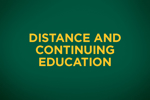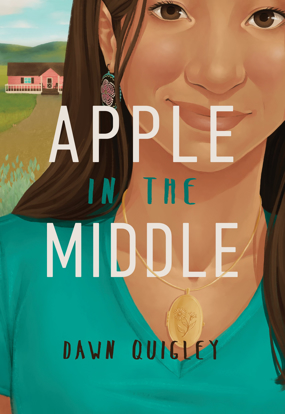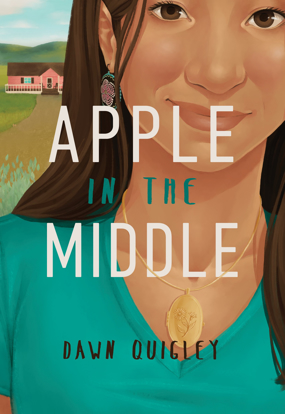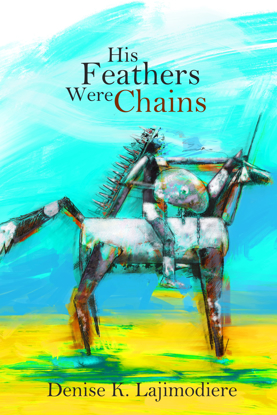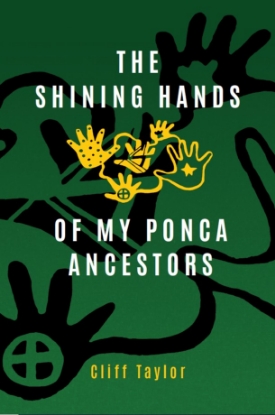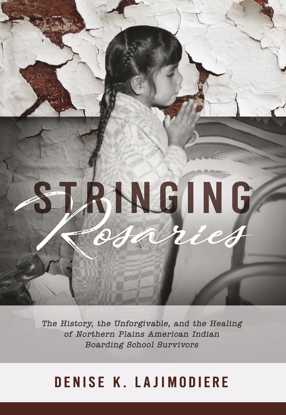Contemporary Voices of Indigenous Peoples Series
Apple in the Middle
Apple Starkington turned her back on her Native American heritage the moment she was called a racial slur for someone of white and Indian descent, not that she really even knew how to be an Indian in the first place. Too bad the white world doesn’t accept her either. And so begins her quirky habits to gain acceptance. Apple’s name, chosen by her Indian mother on her deathbed, has a double meaning: treasured apple of my eye, but also the negative connotation—a person who is red, or Indian, on the outside, but white on the inside. After her wealthy father gives her the boot one summer, Apple reluctantly agrees to visit her Native American relatives on the Turtle Mountain Indian Reservation in northern North Dakota, for the first time. Apple experiences conflict as she deals with the culture shock of Indian customs and the Native Michif language, while trying to find a connection to her dead mother. She also has to deal with a vengeful Indian man who has a violent, granite-sized chip on his shoulder because he loved her mother in high school but now hates Apple because her mom married a white man. Yet, as Apple meets her Indian relatives this summer, she finds that she just may have found a place to belong. One by one, each character—ranging from age five to eighty-five—teaches her, through wit and wisdom, what it means to be a Native person, but also to be a human being while finding her place in the world. Apple shatters Indian stereotypes and learns what it means to find her place in a world divided by color.
Debut Young Adult Native American novel, by Dawn Quigley. Hardcover. 268 pp.
Winner of the 2018 Moonbeam Children's Book Award for Young Adult Fiction--General and the 2020 American Indian Youth Literature Honors Award
Apple in the Middle (pb)
Apple Starkington turned her back on her Native American heritage the moment she was called a racial slur for someone of white and Indian descent, not that she really even knew how to be an Indian in the first place. Too bad the white world doesn’t accept her either. And so begins her quirky habits to gain acceptance. Apple’s name, chosen by her Indian mother on her deathbed, has a double meaning: treasured apple of my eye, but also the negative connotation—a person who is red, or Indian, on the outside, but white on the inside. After her wealthy father gives her the boot one summer, Apple reluctantly agrees to visit her Native American relatives on the Turtle Mountain Indian Reservation in northern North Dakota, for the first time. Apple experiences conflict as she deals with the culture shock of Indian customs and the Native Michif language, while trying to find a connection to her dead mother. She also has to deal with a vengeful Indian man who has a violent, granite-sized chip on his shoulder because he loved her mother in high school but now hates Apple because her mom married a white man. Yet, as Apple meets her Indian relatives this summer, she finds that she just may have found a place to belong. One by one, each character—ranging from age five to eighty-five—teaches her, through wit and wisdom, what it means to be a Native person, but also to be a human being while finding her place in the world. Apple shatters Indian stereotypes and learns what it means to find her place in a world divided by color.
Debut Young Adult Native American novel, by Dawn Quigley. Hardcover. 264 pp.
Winner of the 2018 Moonbeam Children's Book Award for Young Adult Fiction--General and the 2020 American Indian Youth Literature Honors Award
His Feathers Were Chains
Lajimodiere’s newest collection of poetry takes its title from a statue the author observed--an Indian on a horse--fashioned from welded-together farm implements. The premise of the collection is overt criticism of settler society, but the poetry is subtle, approachable, and grounded in Ojibwe knowledge and customs. Feathers is divided into five sections: Broken Glass Dreams, Identity, His Feathers Were Chains, Thin White Heat, and Dancing with a Whirlwind.
The Shining Hands of My Ponca Ancestors
In sincere, from-the-heart storytelling, The Shining Hands of My Ponca Ancestors depicts the life of a young, contemporary Ponca, who—with the help of friends, relatives, spirits, and ancestors—is learning what is really possible for him and his tribe and how dramatically different that is from the dominant cultural messaging of his youth. An account of inspiration, ancestor intervention, the indestructible Indigenous core of his Native people, and the immense beauty of an ongoing way of life, Shining Hands is rife with meaning for Native and non-Native readers alike. Viewed through his personal life, Shining Hands is a prayer for the young that they may see their own powerful potential, too.
Stringing Rosaries: The History, the Unforgivable, and the Healing of Northern Plains American Indian Boarding School Survivors (hardcover)
Denise Lajimodiere's interest in American Indian boarding school survivors’ stories evolved from recording her father and other family members speaking of their experiences. Her research helped her to gain insight, a deeper understanding of her parents, and how and why she and her siblings were parented in the way they were. That insight led her to an emotional ceremony of forgiveness, described in the last chapter of Stringing Rosaries.
The journey to record survivors’ stories led her through the Dakotas and Minnesota and into the personal and private space of boarding school survivors. While there, she heard stories that they had never shared before. She came to an understanding of new terms: historical and intergenerational trauma, soul wound.
Stringing Rosaries presents a brief history of the boarding school programs for Indigenous Americans, followed by sixteen interviews with boarding school survivors, and ending with the author's own healing journey with her father.
Hardcover, 332 pp., 41 black and white photographs, updated listing of more than 400 US boarding schools by state, appendix, bibliography, and index.










